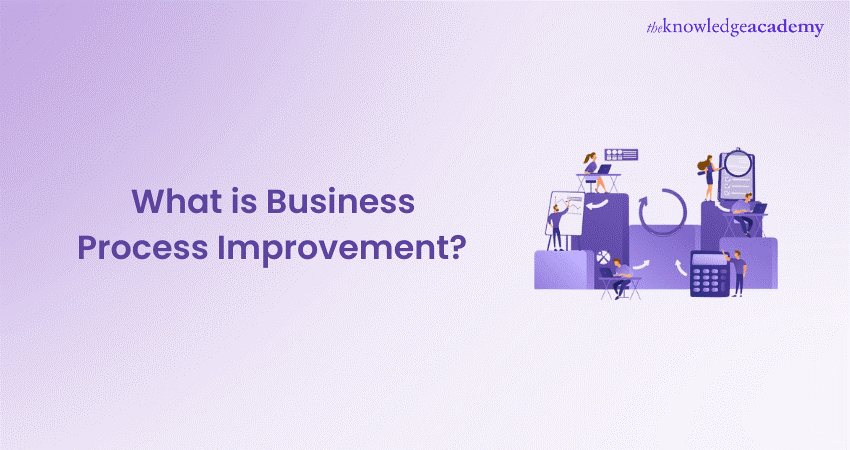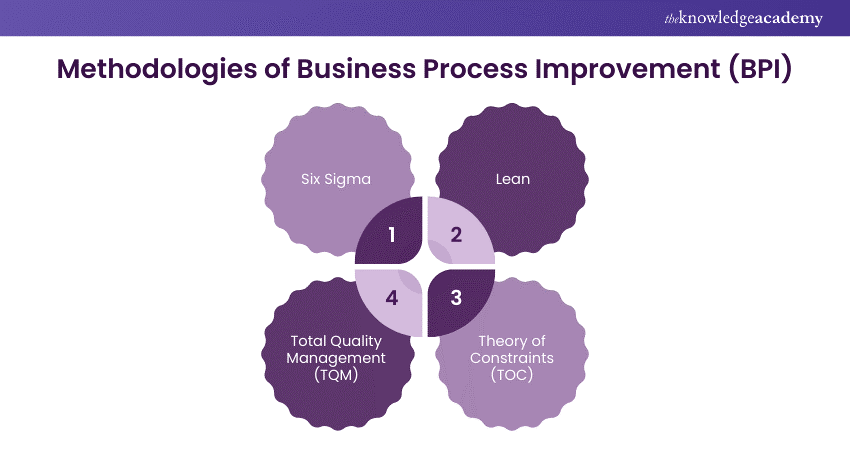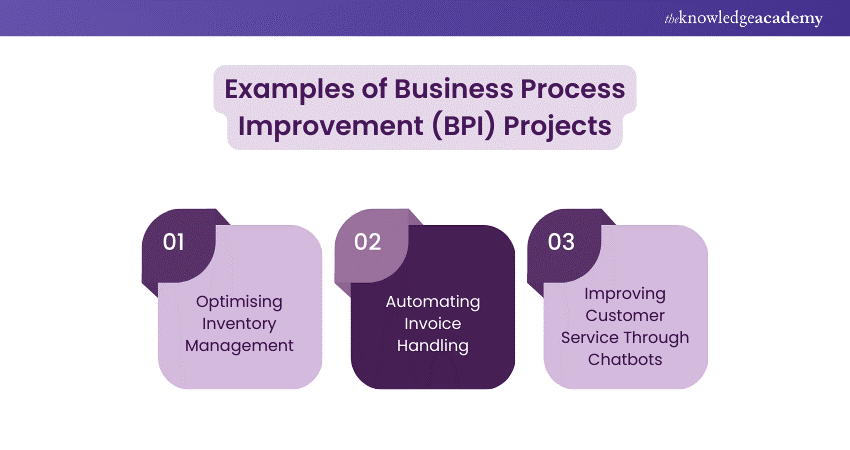We may not have the course you’re looking for. If you enquire or give us a call on 01344203999 and speak to our training experts, we may still be able to help with your training requirements.
Training Outcomes Within Your Budget!
We ensure quality, budget-alignment, and timely delivery by our expert instructors.

In today’s competitive business landscape, enhancing operational efficiency is essential for success. Based on studies, businesses can lose up to 20-30% of revenue due to workflow inefficiencies.
By identifying bottlenecks and removing unnecessary steps, companies can not just optimise processes but also improve satisfaction in output. This blog will explore What is Business Process Improvement, its impact on business performance, and the strategies for implementing practical improvements.
Table of Contents
1) What is Business Process Improvement (BPI)?
2) Methodologies of Business Process Improvement (BPI)
3) Importance of Business Process Improvement (BPI)
4) Implementing Business Process Improvement (BPI)
5) Examples of Business Process Improvement projects (BPI)
6) Benefits and Challenges of Business Process Improvement
7) Process Improvement Best Practices
8) 15 Metrics for Process Improvement & KPIs You Need to Know
9) How to Track the Business Process Improvement Progress?
10) Conclusion
What is Business Process Improvement?
Business Process Improvement (BPI) involves enterprise leaders actively monitoring business processes to spot inefficiencies. The goal is to identify areas that can be enhanced for greater accuracy, effectiveness, and overall efficiency.
BPI involves identifying operations, employee skills, or enabling technologies that could be optimised or introduced to facilitate smoother procedures, more efficient workflows, and overall business growth.
Importance of Business Process Improvement (BPI)
Business Process Improvement (BPI) is important to enhance the efficiency and performance of any business. Here are the key points which highlights its importance:
1) Cost Reduction and Workflow Streamlining: BPI helps in reducing costs and optimising workflows, further leading to enhanced productivity.
2) Improved Product and Service Quality: BPI improves the quality of products and services quality by enhancing processes, boosting customer satisfaction.
3) Enhanced Agility: BPI increases the agility, enabling swift responses of the company to market and technological changes for maintaining competitiveness.
4) Continuous Improvement: BPI is centred on continuous improvement. This ensures businesses constantly evolve to meet customer needs.
5) Operational Excellence and Long-term Growth: Ultimately, BPI is crucial for achieving operational excellence and sustainable long-term growth.
Implementing Business Process Improvement (BPI)
Implementing Business Process Improvement (BPI) is a methodical strategy that is aimed at boosting the organisational efficiency and effectiveness of their operations. Below is a breakdown of each crucial step in the process:
1) Identify Processes to Improve
Begin by selecting specific processes to improve, ideally starting at the team level to allow for a deep dive into the process. This approach helps build process improvement skills for tackling more complex organisational processes later.
2) Map the Process
Once a process is selected, document each step using a flowchart or diagram. Involve regular users of the process to ensure all steps are captured accurately, providing a clear picture of the current process before making changes.
3) Analyse the Process
Use the flowchart to identify problems within the process. Engage all team members in discussions to gain diverse perspectives on what works, what doesn’t, and where bottlenecks occur. This collaborative analysis helps pinpoint areas for improvement.
4) Redesign the Process
After identifying issues, work with those involved to redesign the process. Ensure everyone understands the process’s goals and explores solutions collaboratively. Conduct an impact analysis if the process is complex to understand the full effects of changes.
5) Acquire Resources
List and secure the necessary resources for implementing the new process. Communicate with relevant departments to ensure they understand the benefits and requirements of the new process, facilitating smoother implementation.
6) Implement and Communicate Change
Consider running a pilot to identify potential issues before a full rollout. Involve affected individuals early in the process to encourage buy-in and reduce resistance to change.
7) Monitor Results
You need to establish key indicators to assess the improvement's effectiveness. After implementation, monitor the process closely to make sure that it performs as expected and make adjustments based on feedback from those involved (if needed).
Methodologies of Business Process Improvement (BPI)
BPI uses strategies to improve efficiency and productivity. Here's an overview of several fundamental methodologies:

1) Six Sigma
This data-driven approach aims to minimise defects, errors, and process variations to improve performance and customer satisfaction. The goal is to achieve a defect rate of 3.4 parts per million, representing six standard deviations from the mean.
2) Lean Six Sigma
This methodology focuses on waste reduction and process efficiency by combining Lean manufacturing principles with Six Sigma. It integrates the efficiency tools of Lean principle with Six Sigma's statistical rigour to enhance overall performance.
3) Total Quality Management (TQM)
TQM is a management philosophy focused on achieving high quality in all aspects of an organisation. It involves principles such as customer focus, continuous improvement, employee involvement, and data-driven decision-making.
4) Performance Metrics and Key Performance Indicators (KPIs)
These tools measure and assess performance, providing data to evaluate progress toward objectives. KPIs are critical metrics linked to organisational goals, driving performance improvement and decision-making.
Examples of Business Process Improvement (BPI) Projects
Business process improvement (BPI) is a powerful strategy for enhancing organisational performance across various industries. Here are detailed examples of BPI projects that organisations commonly undertake:

1) Manufacturing Industry
Lean Manufacturing principles, such as value stream mapping, waste reduction, and continuous improvement, are key to manufacturing BPI. By analysing and optimising production processes, organisations can achieve greater efficiency, reduced lead times, and improved resource utilisation. Implementing quality management systems like ISO 9001 helps establish robust quality control processes, monitor performance, and drive continuous improvement.
2) Healthcare Sector
BPI helps in optimising efficiency in operations, enhances patient care, and improves delivery of essential healthcare's facility. Techniques such as streamlining administrative processes (patient registration, appointment scheduling, billing, and insurance claim processing) reduce paperwork and waiting times, enhancing efficiency and patient satisfaction. Additionally, BPI helps optimise patient flow and care coordination by analysing the patient journey, identifying bottlenecks, and implementing strategies to improve movement through various departmenanalysing.
3) Financial Services
BPI enhances operational efficiency, customer experience, and regulatory compliance in financial services. Streamlining customer onboarding processes, including account opening, KYC procedures, and documentation, reduces paperwork and enhances data accuracy. This optimisation improves the overall customer experience and operational efficiency.
4) Retail Sector
BPI enables retailers to improve operational effectiveness, reduce costs, enhance customer satisfaction, and stay competitive. By continuously evaluating and refining processes, retailers can adapt to changing consumer demands, improve profitability, and deliver exceptional shopping experiences. Implementing accurate demand forecasting, optimising replenishment processes, and leveraging technology solutions like RFID helps reduce stockouts, minimise excess inventory, and improve inventory turnover rates.
Benefits and Challenges of Business Process Improvement
Business process improvement (BPI) offers numerous benefits and faces several challenges. Here are the key points framed into complete sentences:
Benefits of Business Process Improvement
a) Optimised processes can significantly enhance customer service, customer experience, and ultimately customer satisfaction.
b) Improved processes can lead to a better worker experience.
c) Automation, innovation, and intelligence in processes support continuous enterprise transformation.
Challenges of Implementing BPI
a) Workers may resist changes introduced by BPI initiatives.
b) Unplanned improvements that are not aligned with business goals can hinder success.
c) Lack of communication across the organisation to relevant parties can impede the implementation of BPI.
Process Improvement Best Practices
To establish a strong Business Process Improvement (BPI) discipline, organisations should follow these best practices:
1) Document and Analyse Processes: Ensure the organisation has well-documented processes with good visibility into workflows, positions, systems, and data. Adopt a methodology for analysing processes and identifying opportunities for improvement.
2) Resource Commitment and Stakeholder Engagement: Commit adequate resources to support BPI as an ongoing exercise within the organisation. Solicit input and ideas from process stakeholders on possible areas of improvement and communicate improvement strategies to ensure their buy-in.
3) Change Management and Training: Invest in change management programs, including employee training, to ensure the successful implementation of improvement strategies. Monitor results to ensure compliance with changed workflows within recently improved processes.
4) Metrics and Executive Support: Establish metrics to measure the success of improvements and use these metrics to gain executive support for additional BPI projects.
5) Integration with BPM: Incorporate the BPI discipline into an overall business process management (BPM) practice to ensure continuous improvement and alignment with organisational goals.
15 Metrics for Process Improvement & KPIs You Need to Know
Process improvement metrics and key performance indicators (KPIs) are essential for analysing and assessing the performance, progress, and quality of business processes. By using the right metrics, organisations can capture process data to identify issues such as incorrectly modeled processes or inefficiencies caused by responsible individuals.
To effectively track process improvement efforts, several key metrics should be considered. These include productivity, efficiency, timeliness, return on investment (ROI), rate of production, takt time, cycle time, error rate, quality rate, effectiveness, cost-effectiveness, competitiveness, turnaround time, capacity, and value. Each metric provides valuable insights into different aspects of process performance, helping organisations to optimise and enhance their operations.
How to Track the Business Process Improvement Progress?
To track your progress in process improvement, you need to select an appropriate measurement methodology. There are several effective ways to do this, such as using control charts, which graphically show how a process changes over time, helping you determine if it's improving, declining, or remaining stable.
Additionally, you can use process maps (like flowcharts) to visualise the steps in a process and identify areas for improvement. Checklists can help you pinpoint specific areas needing attention, while journals allow you to document progress and reflect on successes and challenges. To stay committed, consider adding a recurring task in your work management tool to generate and share progress reports with your team.
Conclusion
Business Process Improvement (BPI) is a strategy focused on enhancing the efficiency and effectiveness of organisational processes. It is widely used across various industries, including manufacturing, healthcare, finance, and retail. By optimising processes, organisations can improve quality, reduce costs, and increase customer satisfaction. Furthermore, this approach helps businesses adapt to changing demands, streamline operations, and achieve better overall results.
Frequently Asked Questions

The purpose of Process Improvement is to make organisational operations more efficient and effective. By examining, evaluating, and refining business processes, organisations can eliminate inefficiencies, enhance quality, boost productivity, and deliver superior customer experiences.

Process Improvement is also known as Business Process Improvement (BPI), business process optimisation, process reengineering, or simply process optimisation.

The Knowledge Academy takes global learning to new heights, offering over 30,000 online courses across 490+ locations in 220 countries. This expansive reach ensures accessibility and convenience for learners worldwide.
Alongside our diverse Online Course Catalogue, encompassing 19 major categories, we go the extra mile by providing a plethora of free educational Online Resources like News updates, Blogs, videos, webinars, and interview questions. Tailoring learning experiences further, professionals can maximise value with customisable Course Bundles of TKA.

The Knowledge Academy’s Knowledge Pass, a prepaid voucher, adds another layer of flexibility, allowing course bookings over a 12-month period. Join us on a journey where education knows no bounds.

The Knowledge Academy offers various Business Process Improvement Training , including Management Training for New Managers, the Introduction to Management Course, and Introduction to Managing People Training. These courses cater to different skill levels, providing comprehensive insights into Business Process Management.
Our Business Skills Blogs cover a range of topics related to Business Process Improvement Training, offering valuable resources, best practices, and industry insights. Whether you are a beginner or looking to advance your Business Process skills, The Knowledge Academy's diverse courses and informative blogs have got you covered.
Upcoming Business Skills Resources Batches & Dates
Date
 Certified Kanban Foundation and Practitioner Training
Certified Kanban Foundation and Practitioner Training
Mon 7th Apr 2025
Mon 4th Aug 2025
Mon 3rd Nov 2025







 Top Rated Course
Top Rated Course



 If you wish to make any changes to your course, please
If you wish to make any changes to your course, please


